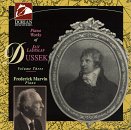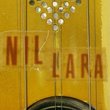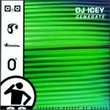| All Artists: Jan Ladislav Dussek, Frederick Marvin Title: Dussek: Piano Works, Vol. 3 Members Wishing: 1 Total Copies: 0 Label: Dorian Recordings Release Date: 12/12/1995 Genre: Classical Styles: Chamber Music, Forms & Genres, Sonatas, Historical Periods, Classical (c.1770-1830) Number of Discs: 1 SwapaCD Credits: 1 UPC: 751758013827 |
Search - Jan Ladislav Dussek, Frederick Marvin :: Dussek: Piano Works, Vol. 3
 | Jan Ladislav Dussek, Frederick Marvin Dussek: Piano Works, Vol. 3 Genre: Classical
|
Larger Image |
CD DetailsSimilarly Requested CDs
|
CD ReviewsDussek Piano Sonatas Played With Zest & Charm Jeffrey Lipscomb | Sacramento, CA United States | 05/27/2005 (5 out of 5 stars) "An important contemporary of Haydn, Mozart and Beethoven, Jan Ladislav Dussek (1760-1812) was born in Bohemia but spent most of his career abroad. He first went to Belgium, then Holland, and after visiting C. P. E. Bach in Hamburg, Dussek was off to St. Petersburg, where he expanded his reputation as a brilliant pianist and composer and became a favorite of Catherine the Great. By 1786 he was in Paris, and was much favored by Marie Antoinette. However, when the guillotine was falling in 1789, Dussek fled to London, where such stellar names as Haydn, Clementi, Hummel and Viotti were also residing. He married a 17 year old harpist in 1792, went into a publishing business with his wife's father that went bankrupt, and Dussek was forced to flee back to Germany. He became part of the royal household of Prince Louis Ferdinand (to whom Beethoven dedicated his own 3rd Piano Concerto), who was killed in battle by Napoleon's soldiers in 1806. Dussek's last years were spent in Paris, where sadly he became so obese that he had to stay in bed most of the time.
None of Dussek's rather turbulent life is reflected in his music which, like Chopin's, is almost entirely for piano. He composed about 40 piano sonatas and 15 piano concertos (plus one for two pianos). Dussek was an innovator: he took the piano sonata well beyond the boundaries explored by Clementi and Haydn, and his style probably had a great influence on Beethoven's. Dussek was the first composer to write out pedal indications, and in concert he initiated the practice of playing the piano sideways on stage, thereby providing most of the audience a view of his profile or his back. Dussek's sonatas are not profound, but they are works of enormous charm, great fluency, and virtuoso polish. All four of the sonatas on this disc are delightful excursions that foreshadow Weber, Schubert and even Schumann. All but the Grande Sonata op. 75 are in two movements. The op. 51 has an amusing Tarantella 2nd mvt. that hops back and forth between major and minor. The Op. 35 no. 2 features melodies above and below the trill (a practice also adopted by Beethoven). Some of those melodies have a bittersweet quality that sounds like Schubert (who was born the same year this sonata was written!). The Op. 39 no. 3 opens with a theme that is VERY close to the opening of Beethoven's 6th Sonata (they were both written at about the same time, and it's impossible to say if Dussek had heard Beethoven's work or if this is just a serendipitous coincidence). The Grand Sonata op. 75 was composed in 1811, the year before Dussek died. It's in three mvts. and, as Marvin's notes here suggest, it sounds eerily predictive of Schubert, Weber, Chopin and - in the March section - Gustav Mahler! These sonatas are performed by Frederick Marvin with tremendous style and authority. He studied with D'Albert, Schnabel and Serkin before becoming a protege of Claudio Arrau, who singled him out as a "disciple who will carry forward his ideas." Antheil's 4th & 5th piano sonatas were written especially for him. Marvin lived in Vienna for many years before returning to the U. S. and becoming a Professor at Syracuse University. Also a distinguished musicologist, he has been responsible for many of the printed scores of Soler and Dussek. His playing here, in gorgeous recorded sound 1975-80, is even more remarkable considering that Marvin almost lost the use of his right hand in a car accident in 1961 on the Autobahn. This is Vol. 3 of Marvin's Dussek. Dorian CDs are hard to find, but anyone who loves meticulously-crafted playing in the manner of Richter's Haydn and Schnabel's early Beethoven will find Marvin's readings a source of continuing pleasure. Highest recommendation. Jeff Lipscomb " |

 Track Listings (9) - Disc #1
Track Listings (9) - Disc #1







